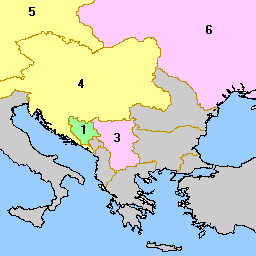in relation to Germany! A Franco-British alliance has always been my dream
...now I can believe I am nearer my goal. It would be difficult to combine with
the Russian alliance. But each day has its task".
-- Theophile Delcasse, French Foreign Minister, 1904
with such an alliance, not a mouse could stir in Europe without our permission"
(Kaiser William, on leaving England after Victoria's funeral, February 1901).
Despite von Bulow's confidence that Britain has no potential allies other than Germany, the first signs that Britain is looking elsewhere emerge early in 1902. Ambassador Metternich reports to Berlin on 30 January 1902: "I hear in the strictest confidence that negotiations have been going on for the last ten days between Chamberlain and the French Ambassador, for the settlement of all colonial differences between the two powers".
Rapprochement between Britain and France has been the long-time aim of the French Foreign Minister, Theophile Delcasse. On his appointment to the Foreign Ministry in 1898, he had declared: "I do not wish to leave this desk without having established an entente with England". With the failure of the Anglo-German alliance talks, the French Ambassador to London, Paul Cambon, suggests that this would be the ideal moment to open negotiations with a view to improving relations between the two old enemies.
The key to better relations between France and Britain lies in smoothing the many colonial conflicts where the claims of the two empires clash, and this will be the objective of the Anglo-French talks. French public opinion remains hostile to Britain over the Boer War, but a visit to Paris by Edward VII is a huge success, and creates unexpected warmth. German politicians and press do not ascribe any lasting importance to the signs of Anglo-French goodwill. The Berlin Post confidently declares that "A real Anglo-French Entente is in the long run impossible because in the colonial sphere differences will inevitably arise".
Nevertheless, on April 7 1904, the Anglo-French Entente (Agreement) is signed. It removes all the points of contention arising out of conflicting colonial claims, even the two most intractable issues - Egypt and Morocco. France relinquishes her interests in Egypt in favour of Great Britain, while Britain in return declares that she will not oppose French intervention in the troubled North African kingdom of Morocco.
When France expresses an intention to intervene in Morocco, in the Anglo-French Entente of April 1904, none of the other signatories to the Treaty of Madrid object. So, ten months later, when France moves to take control of Morocco, it is a great surprise when Germany suddenly reverses her position and warns, through her Ambassador to Paris that "if France were to attempt to change in any way whatever the status of Morocco, Germany would stand behind the Sultan with all its forces". The reason for the change is not that Germany has any interest in Morocco, but that Chancellor von Bulow has come to appreciate the wider implications of the Entente, as a possible first step in an Anglo-French military alliance. He is worried that this might be the beginning of a Triple Entente of France, Britain and Russia, which will encircle Germany with hostile powers.
Bulow thinks that Morocco could be the crisis point which breaks the Entente before it ever really gets started. He chooses Morocco simply because the timing of France's intervention there is good for Germany - in 1905, France is not prepared for war against an enemy as strong as Germany. Furthermore, France's ally, Russia, is unable to offer military assistance as she is preoccupied with her own disastrous war against Japan. So from a German perspective, 1905 is the time to undo the Entente, and humiliate and re-isolate France: the situation in Morocco provides a timely opportunity.
[I urge] the earliest possible thorough cleaning up with France at arms. No waiting ten or twenty years
for a world war, but so thorough a settlement that thereafter there should be no fear of a world war.
France should be provoked until she has no course but to take up arms".
(General Alfred von Schlieffen, Chief of the German General Staff, 1905)
The International Conference on the future of Morocco opens at Algeciras, Spain, on 16 January 1906. Diplomatically, the Conference goes badly for Germany. Germany repeatedly calls for France to renounce any special claim to Morocco, but succeeds only in temporarily slowing France's influence there. The most important result of the conference is that Britain stands by the terms of her Entente with France, and supports France on every issue despite Germany's threats of war.
In the end, Germany achieves at Algeciras the opposite of what she intended. Instead of destroying the new Entente, she drives France and England closer together in the face of her threats. Ambassador Metternich sees clearly what is happening during the course of the conference, and warns Berlin that "the Moroccan question is regarded by everyone here as a trial of strength with the Anglo-French Entente, and our Moroccan policy as an attempt to smash it. Hence the determined opposition." And as the conference ends, Metternich forwards the unwelcome news to Berlin that "The Entente Cordiale ha[s] stood its diplomatic baptism of fire, and emerged strengthened".

At first, the chance of an agreement between the two countries seems remote. The British regard the Russian autocracy as the antithesis of Britain's liberal democratic values, and see Russian expansionism as a threat to British possessions in the Indian sub-continent and the Middle East. For their part, the Russian aristocracy and government bureaucracy do not want their country to be contaminated by British notions of constitutional monarchy or Parliamentary democracy. In fact, the country that conservative Russians admire most is Germany, where they see strength, order, religion and efficiency. Britain's Ambassador to St Petersburg, Sir Arthur Nicholson, comments that: "If the Tsar and the Russian government were free from any other political ties, they would gladly form an intimate alliance with Germany".
Nevertheless, tentative diplomatic contacts between Russia and Britain begin as early as 1904, and on 12 May 1906 formal negotiations start in St Petersburg between the British Ambassador and the Russian Foreign Minister, with a view to improving relations between the two countries. On 31 August 1907, the Anglo-Russian Entente is signed. Like the agreement with France, this is not a defensive or military agreement. The Entente simply defines the limits of the two countries' claims in Tibet, Afghanistan and Persia, thus smoothing out the the potential points of conflict where the Russian and British Empires rub shoulders. It does not make Britain and Russia allies, but it does allow them to be friends.
In Germany, Chancellor von Bulow reacts in the same low-key manner with which he had originally responded to the Anglo-French Entente. He defines the agreement as merely the settlement of specific colonial differences, which does not affect Germany, and assures the Reichstag that "...we need not be alarmed by ententes in regard to matters which do not directly concern us. We cannot live on the emnities of other nations."
But whether von Bulow realises it or not, the importance of the Anglo-Russian Entente goes beyond its immediate terms. It violates one of the key principles of German diplomacy since the days of Bismarck - ie that Britain and Russia are incapable of overcoming their hostility, and that their rivalry might be exploited by Germany. The German Ambassador at St Petersburg notices this, commenting "No one will reproach England for such a policy; one can only admire the skill with which she has carried out her plans. These plans need not necessarily be ascribed to any anti-German tendency, yet Germany is the country most affected by this agreement".
Credit: National Archives of Canada, #C-30619
in the Bosnian Crisis of 1908

1. Bosnia & Herzegovina
2. The Dardanelles
3. Serbia
5. Germany
6. Russia
But German action towards us has been simply brutal, and we won't forget it".
- Tsar Nicholas II, on the conclusion of the Bosnian crisis of 1908.